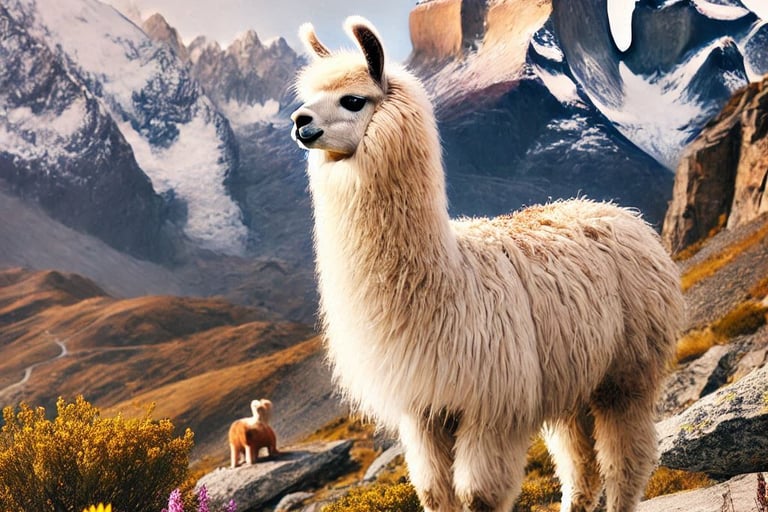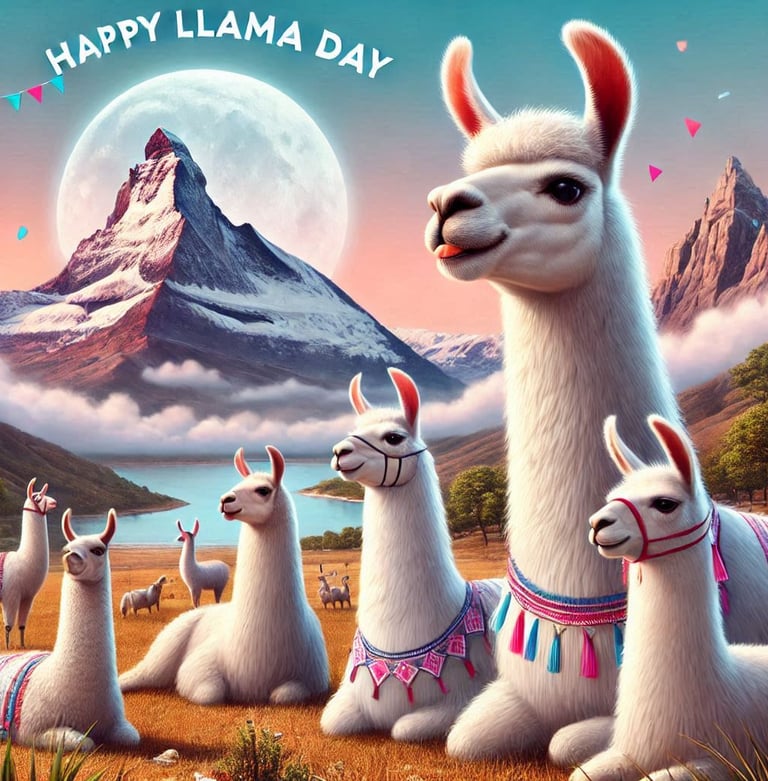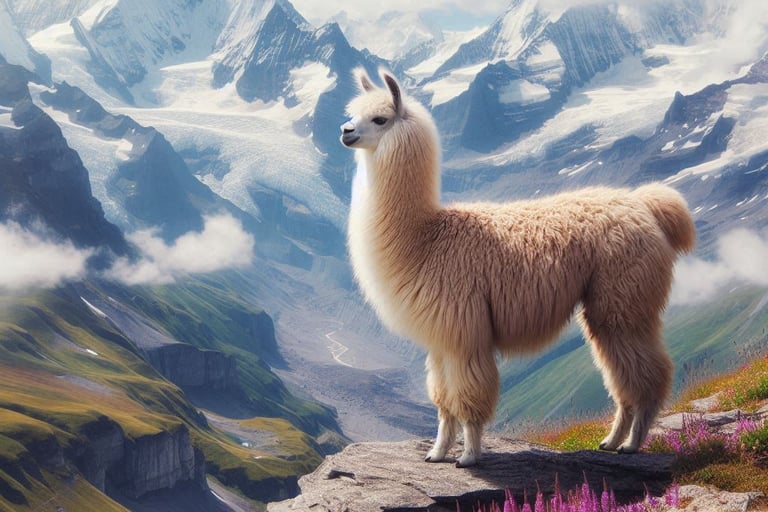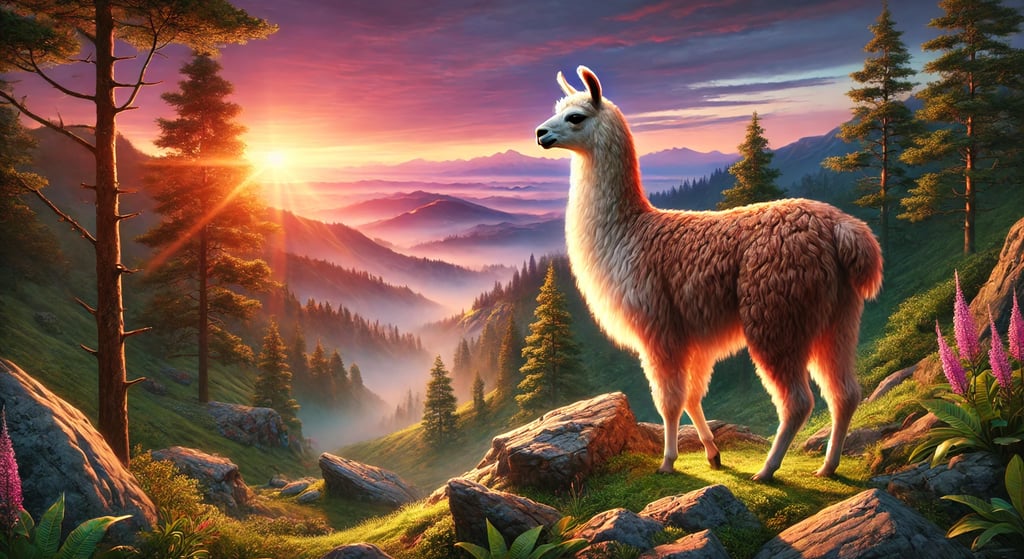Celebrating Llama Day: Origins, Traditions, and Modern Significance
"Discover the charm of Llama Day! 🦙 Explore its origins, celebrate unique traditions, and uncover how this beloved day continues to inspire joy and connection in the modern world. #LlamaDay #Celebrate"
LIFESTYLE
The Trendhub Columnist
12/9/20245 min read


The Origins of Llama Day
Llama Day, a celebration dedicated to the unique and captivating creatures known as llamas, originated from the recognition of their significance in Andean cultures. The roots of this celebration can be traced back to the indigenous peoples of South America, particularly in Peru and Bolivia, where llamas have held economic and spiritual importance for centuries. Initially, the day commemorated the roles llamas played in transportation, agriculture, and textile production, as they were invaluable to local communities.
The formal establishment of Llama Day as a recognized holiday began in the early 2000s, spearheaded by specific organizations advocating for animal welfare and cultural preservation. Key figures from various animal rights groups and community leaders gathered for discussions that highlighted the need for a dedicated day to honor llamas and raise awareness about their well-being. The motivations behind this initiative were multifaceted; it aimed not only to celebrate llamas but also to educate the public about their ecological and economic contributions.
The first Llama Day was celebrated in the summer of 2002, in a small town in Peru, drawing the participation of local farmers, artisans, and families. The event featured traditional music, llamas parading in colorful decorations, and various educational activities focused on the care and significance of these animals. As the years progressed, Llama Day has expanded beyond its original locality, with celebrations now held in various countries around the world, promoting a deeper understanding of both llamas and the cultural heritage they embody.
Over time, Llama Day has transformed into an occasion that not only recognizes the importance of llamas but also emphasizes the necessity of preserving their habitats and promoting their welfare. This evolution reflects the growing interest in animal advocacy and sustainable practices, making Llama Day a significant event in contemporary society.
Llama Day Traditions and Celebrations
Llama Day, celebrated annually, embodies a rich tapestry of traditions and festivities that vary across different cultures and communities. The celebrations typically feature spirited parades, where llamas, adorned with colorful decorations, march alongside their handlers and enthusiastic participants. Such parades often take place in local parks or town squares, drawing crowds eager to witness the unique sight and engage with the animals that have become symbols of joy and companionship.
In addition to parades, many communities organize educational workshops during Llama Day, highlighting the ecological significance of llamas and their domesticated variations. These workshops serve to inform the public about the multifaceted roles llamas play in various ecosystems, including their contributions to agriculture and as pack animals. Participants often learn about responsible llama ownership, care, and training techniques, fostering a deeper appreciation for these remarkable creatures.
Community gatherings are also a prominent feature of Llama Day celebrations. These social events typically involve local vendors offering llama-themed merchandise, crafts, and food, culminating in a festive atmosphere that appeals to families and llama enthusiasts alike. Interactive activities, such as "Meet the Llamas" sessions, allow attendees to closely interact with these gentle animals, enhancing awareness about their temperament and care needs.
Furthermore, many celebrations incorporate traditional music and dance, providing an opportunity for cultural expression and unity. These events not only celebrate llamas as significant animals in local heritage but also promote environmental stewardship and sustainable practices within the community. By recognizing the deep-rooted connection between humans and llamas, Llama Day celebrations foster an enduring legacy of appreciation, ensuring that future generations continue to honor these beloved animals.
The Relevance of Llama Day Today
Llama Day has evolved to hold significant contemporary relevance as society increasingly recognizes the diverse roles these remarkable animals play. One of the most prominent aspects is the use of llamas as therapy animals. In various therapeutic settings, llamas contribute positively to mental health and well-being. Their gentle nature and calming presence can be particularly beneficial for individuals dealing with anxiety, depression, or trauma. The incorporation of llamas in therapy programs has gained traction, shedding light on the profound impact animals can have on human psychological health.
Moreover, llamas are becoming popular in sustainable farming practices. Unlike some livestock, llamas are low-impact animals, requiring less land and resources while still providing essential benefits. Their ability to guard herds from predators makes them valuable assets for farmers who prioritize animal welfare and sustainable methods. By promoting the use of llamas in agriculture, Llama Day highlights their contribution to more environmentally friendly farming practices, aligning with today's growing focus on sustainable living.
Furthermore, Llama Day serves as an important platform for fostering connections between people and animals. This day not only promotes animal welfare by encouraging responsible care and treatment of llamas but also emphasizes the importance of biodiversity. Through educational initiatives and community events, the celebration underscores the need to protect various species, showcasing llamas as ambassadors to raise awareness about conservation. As educational programs enhance public understanding of the ecological significance of diverse animal life, Llama Day ultimately reinforces the interdependence of all living beings.
In conclusion, Llama Day has transcended its origins to become a celebration that emphasizes the multifaceted importance of llamas in modern society, promoting both animal welfare and environmental sustainability.
Getting Involved: How You Can Celebrate Llama Day
Celebrating Llama Day offers an excellent opportunity for individuals and communities to unite and honor these remarkable animals. One way to partake in this celebration is to organize or attend local events featuring llamas. Many farms and rescue organizations host special Llama Day festivities, which may include guided farm tours, educational talks, and hands-on activities such as llama feeding or grooming. Engaging with these local establishments promotes awareness about llamas and supports their welfare and conservation.
If you prefer an at-home celebration, consider hosting a Llama Day party. Deck out your space with llama-themed decorations, serve llama-shaped treats and encourage friends and family to learn about llama care and their unique characteristics. Activities like crafting llama masks or drawing llamas can be both fun and educational for participants of all ages. You might even set up a virtual gathering where everyone can share their favorite llama facts or stories, thus fostering a sense of community, even from a distance.
Social media plays a vital role in raising awareness for Llama Day. Harness platforms such as Instagram, Facebook, or Twitter to share your own llama experiences or insights into how llamas contribute to agriculture and eco-friendliness. Use relevant hashtags and engage with other llama enthusiasts to promote discussions and exchanges of ideas. This not only amplifies your celebration but also cultivates an online community where individuals can connect over their love for these fascinating creatures.
Furthermore, volunteering at local farms or rescue organizations can help deepen your understanding of llamas while contributing to their care. By participating in Llama Day activities, you celebrate these incredible animals and inspire others to appreciate their importance in our lives and environment.








